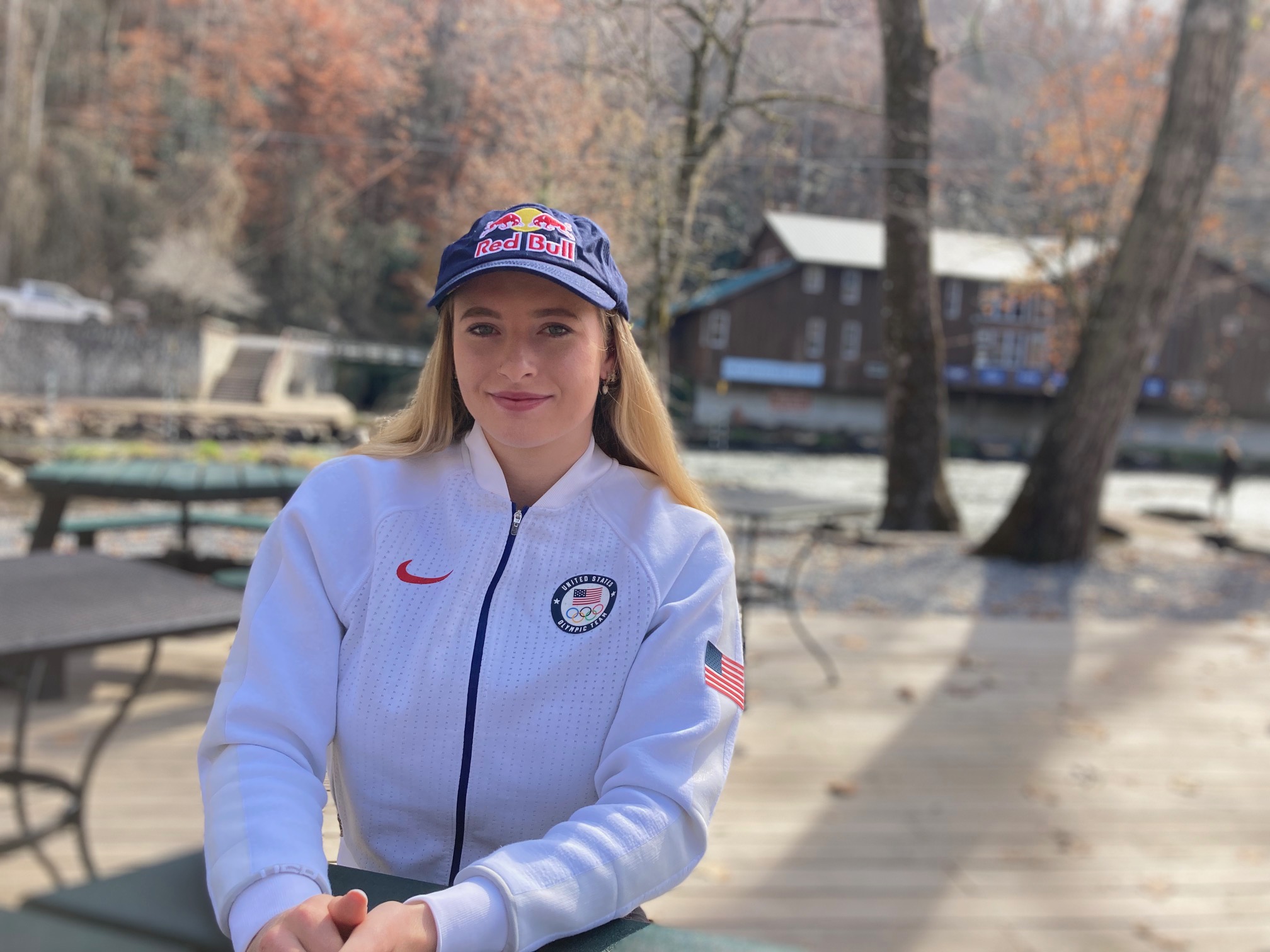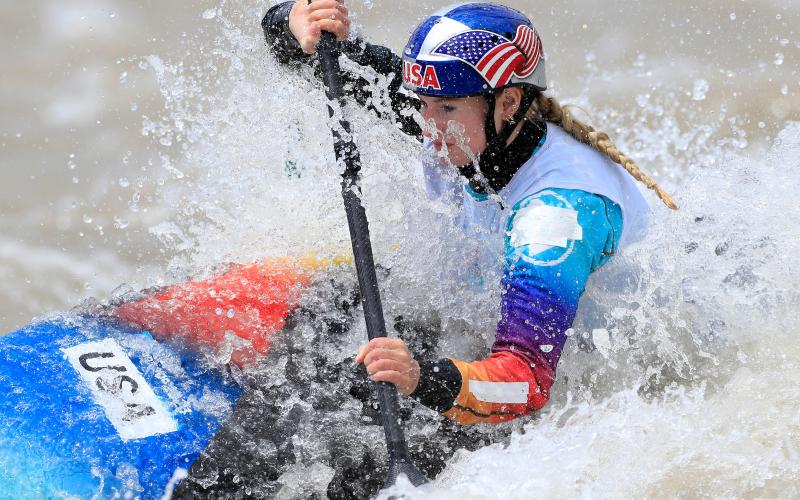
Jessica Webb
editor@thesmokymountaintimes.com
Evy Leibfarth was back home in Swain County last week during a short break between the 2023 season and when winter training starts. The 19-year-old Red Bull sponsored athletes is one of the youngest and most decorated paddlers in the world. She recently won gold in women’s K1 kayak slalom in the 2023 Pan American Games in Santiago, Chile and is preparing to compete for a spot in the 2024 Olympic Summer Games in Paris.
Coming back to paddle the Nantahala is always a welcome experience for her, as the river holds a special place in her heart. Most of the water she paddles on now for competing is artificial, so she said it’s cool to be back on the natural water.
“I’ve been paddling here since I was 3-4 years old, and my parents met here as raft guides and shared their love of the river with me as I was growing up,” she said. “growing up here is awesome, there’s such a great community of athletes.”
Her parents are Lee Leibfarth and Jean Folger, and Lee is her coach.
Evy has been competing internationally since she was 12 years old and has had aspirations of competing at the Olympic level since then. She first competed at the Olympics in the 2020 Tokyo games and placed 12th in K1 and 18th in canoe slalom.
It was the first time C1 was included in the Olympics for women, and she said it was amazing to be in that first group of women.
She hopes to race in all three categories in Paris: single kayak, canoe and the newly added category of kayak cross.
“If I do go to Paris, which I really hope I will, my goal is the same as everyone else’s, I want to win a medal, but I really want to have good runs in a race I feel proud about,” she said. “In Tokyo, it was such an amazing experience, but I didn’t paddle as well as I wanted to. I want to be able to use all my training and be in the right mental space. I’m out there for the love of it.”
She has had the chance to train twice in Paris, so far.
“The course is Paris is really fun, it’s very technical, so there are a lot of moves you have to spend time trying to figure out,” she explained. The first time she was there was winter and brutally cold, she said, but when she went back in the summer the weather was beautiful and the course had changed a bit.
“I really love the course,” Leibfarth said. “I’m so excited to spend more time there and I feel like I paddled well on it.”
The winter doesn’t really offer a break from training if anything, she said, it’s more intense.
“My training days definitely depend on where I am in the world and what season it is,” she said. During the off-season, there are more workouts in addition to paddling.
“During the racing season, I cut down on the workouts and focus more on the quality of those workouts and specific technical things to work on rather than base training,” she said.
Until January, she can be found on the Nantahala as well as training at the U.S. National Whitewater Center in Charlotte. Then, she’ll be in Australia for a couple of months and compete in the Australia Open Oceana Championships before returning to the U.S. for the final Olympic team trials. Then, it’s off to the European season and Paris.
Much like being on the water, she’s grown up traveling the world. She admits the logistics can be difficult. “I’m perpetually jetlagged, but I’m just so used to rallying through it,” she said.
Traveling for races offers it’s own sense of community.
“It’s really cool because all of these races also other team world cup teams are going to it’s a lot of the same people it never really feels alone,” she said.
She described the Pan Am games “almost like a mini-Olympics” with just one person per category, but said it’s offers an opportunity to connect with athletes from across the Americas in a very European-dominated sport.
On winning her second gold there, she said it was one of her biggest goals since she competed in Lima in 2019 and she was happy to come back and give it her all.
Another highlight was a trip across Chile she took after with her friend Sofia Reinosa from Team Mexico.
“I was able to do 10 days running rivers, going down waterfalls,” she said. “It was a big step up out of my comfort zone, but it was so fun reconnecting with the river in a different way.”
One highlight was going down Blanco Sur in Pucon, Chile— a significant drop.
“I was definitely pretty nervous,” Leifbarth said. “So, I wasn’t sure how I would feel about it, but it was so much fun, and I’m looking to do more of that kind of paddling in the future.”
A mix of her Dad’s know-how and a competitive spirit is what landed Evy in slalom.
“I grew up doing almost all the different kinds of paddling river running, freestyling, whitewater, I found a love for slalom I loved competing being able to compete with myself in that way,” she said, adding it’s special to have her Dad be able to travel the world with her as his coach.
On why she competes in multiple races, she said, “Why choose when I can do both because the skills transfer between them.”
In canoe slalom racing, she said she feels a lot more connected to the water. “I don’t have as high a stroke rate, and I’m just using the water and focusing on the technique.”
In kayak slalom, she’s “pulling the water as hard as I can.”
“It’s really fun to be able to run the same course in two completely different ways and with two different mindsets,” she said.
As one of the youngest athletes in the sport, she admits it was intimidating at first, but she said the US Team has a great environment and that some of the boaters she looked up to when she was younger have been great mentors. She hopes to be an inspiration to younger women in the sport.
Her message to young female athletes is to “go out there and have fun with it.”
“Kayaking is a really special sport, and you can do it all,” she said.
“A lot of people think you have to always be outdoors and bring your gear to be successful, but you can wear makeup and be in cities and you can still be a bad ass kayaker; you don’t have to choose between different parts of yourself, you can do it all.”
Lastly, she said she’s grateful for the support she’s received from Swain County residents.
“I feel like since I was really young, everyone has supported my dreams and helped me get to where I am today, and that has made such a difference,” she said.

